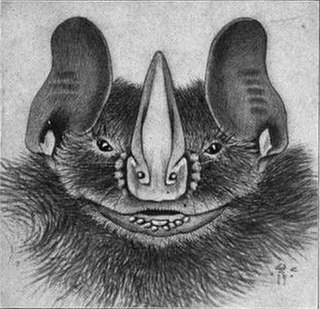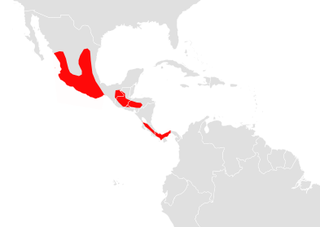
The grey heron is a long-legged wading bird of the heron family, Ardeidae, native throughout temperate Europe and Asia, and also parts of Africa. It is resident in much of its range, but some populations from the more northern parts migrate southwards in autumn. A bird of wetland areas, it can be seen around lakes, rivers, ponds, marshes and on the sea coast. It feeds mostly on aquatic creatures which it catches after standing stationary beside or in the water, or stalking its prey through the shallows.

Andersen's fruit-eating bat is a bat species found in South America.

The silver fruit-eating bat is a South American bat species of the family Phyllostomidae.

The gnome fruit-eating bat is a bat species found in Bolivia, Brazil, Colombia, Ecuador, French Guiana, Guyana, Peru, Suriname and Venezuela. This species was originally determined to be different from the other known species of fruit bats, but later, in 1994 was mistakenly grouped under Artibeus cinereus as a synonym. However, this has since been corrected by more closely studying their physical differences and by biomolecular analysis.
The least big-eared bat is a bat species of the family Phyllostomidae, found in northwestern Brazil and eastern Colombia. It is the only species within its genus.

Dermanura is a genus of leaf-nosed bats.

The Humboldt big-eared brown bat is a species of vesper bat in the family Vespertilionidae. It is found in Colombia and Venezuela.

The mangrove whistler is a species of bird in the family Pachycephalidae found in South-east Asia.

The Aztec fruit-eating bat is a species of bat in the family Phyllostomidae.

The Toltec fruit-eating bat is a species of bat in the family Phyllostomidae. It is also sometimes called the "lowland fruit eating bat."

Thomas's fruit-eating bat, sometimes also popularly called Watson's fruit-eating bat, is a species of bat in the family Phyllostomidae. It is found from southern Mexico, through Central America to Colombia. Its South American range is to the west of the Andes. The species name is in honor of H. J. Watson, a plantation owner in western Panama who used to send specimens to the British Natural History Museum, where Oldfield Thomas would often describe them.
Rosenberg's fruit-eating bat is a species of bat in the family Phyllostomidae. It is found in humid tropical forests in the El Chocó region on the coast of western Colombia and northwestern Ecuador at altitudes below 500 m. Until recently it was included within D. glauca, a canopy frugivore that also eats insects. It was elevated to full species status in 2009. The specific name is in honor of collector W. F. H. Rosenberg. The species is regarded as common, but is likely threatened by the deforestation of its habitat.
The minor red bat is a species of bat from the family Vespertilioninae. It is found in the Bahamas, Hispaniola, and Puerto Rico in the Caribbean, though there are only six known individuals in the latter.
The Bogota fruit-eating bat is a species of bat found in South America.
Dermanura rava is a species of leaf-nosed bat found in Central and South America.












